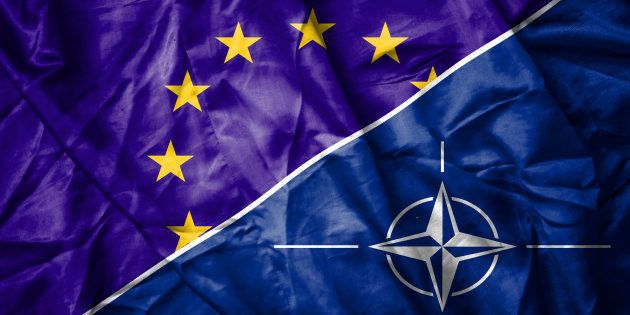Mercredi 16 juin, j’ai participé au dialogue parlementaire transatlantique organisé par la Fondation Friedrich Ebert Stiftung qui avait pour thème le rôle des armes nucléaires pour l’OTAN et les États-Unis.
Après les interventions respectives du membre de la Chambre des représentants des États-Unis John Garamendi, de la vice-présidente du groupe SPD au Bundestag Gabriela Heinrich et de la députée norvégienne Anniken Huitfeldt, de nombreux parlementaires sociaux-démocrates et progressistes issus de différents pays européens ont débattu du rôle des armes nucléaires dans l’Alliance transatlantique.
Les parlementaires allemands ont présenté la position allemande de dénucléarisation de leur pays sur le plan militaire, dans la lignée de ce qui a été fait sur le plan civil. Pour ma part, je suis intervenue pour partager la vision française sur ce débat toujours très sensible.
Retrouvez ci-dessous le texte de mon intervention en anglais :
***
The current international context forces us to reflect on the legitimacy of nuclear deterrence. Are we entering a post-nuclear era (with the existence of weapons of another more dissuasive nature) or a neo-nuclear ear (with nuclear power dissuading from the use or the development of new weapons) ?
As a linguist, I am convinced that word shape our thinking and our vision of the world, and the importance of choosing them well in order to be understood. When I visited different European countries, during my previous work on European defense, something confirmed my feeling: the same word can have different meanings and interpretations from on language to another. I am thinking here of the concept of “strategic autonomy” for example. This is why, while this conference brings together parliamentary colleagues from many countries, I think fundamental to start with a semantic clarification: what does “deterrence” mean for each of us? For France, the concept of deterrence is solely nuclear, and never to be used as a first track but in a response to an attack. For NATO, the notion of deterrence encompasses both nuclear and conventional forces.
As a French parliamentarian, I would like to say a few words about the French vision. First, since the presidency of François Mitterrand, France has rejected the idea of the tactical use of nuclear weapons and remains in a strategic posture of warning and deterrence: the role of French nuclear deterrence is limited to the extreme circumstances of self-defense. Second, France is one of the countries promoting disarmament measures. France signed the Non-proliferation of nuclear weapons treaty (NPT) in 1992, stopped all production of military plutonium in 1992 and highly enriched uranium in 1996, stopped its nuclear tests definitively in 1996, and completed the dismantling of the land component in 1998.
But the international security context is marked by renewed threats such as the use of force, regional tensions and proliferation crises but also new threats that jeopardize our vital and strategic interests. I am thinking about hybrid threats ; cyber-attacks or space attacks relative to essential services (communication, navigation, intelligence…), which are becoming accessible to a growing number of actors. The nature of conflicts evolution is characterized by threats combining conventional modes of actions, disruptive technologies and nuclear power, which can lead to high intensity war. In a word, there are no more threats to our borders, but there are no more borders to ours threats !
Faced with these simultaneous, multifaceted and multipolar threats to our vital interests, generated by disruptive technologies, peace will not be guaranteed by unilateral disarmament but by our capability to display our power and our firmness in international relations. The same is true at European level.
Therefore, France does not support a total ban on nuclear weapons. Like many other States committed to nuclear disarmament, France has decided not to sign the Treaty on the prohibition of nuclear weapons (TPNW), which was opened for signature in 2017. The major risk is that nuclear weapons are reserved for dictatorships, which are freed from all control. In 2014, the former French defense minister, Jean-Yves Le Drian, clearly identified this risk and said that : “We must avoid that the generous call for a world without nuclear weapons prepares a world where only the dictators would dispose of it”.
The current question is how to avoid both a war and a new arms race. As the former French General Secretary of defense and national security -my friend Louis Gautier- wrote: “Europeans would be well advised not to get caught up in the trap of a new arms race. But will they dare take the initiative to be united and build together the stability of the European continent?”
In an increasingly chaotic world, let’s not be “sleepwalkers”. The uncertainty and ambiguities of international relations force us to be able to rely only on ourselves. Let’s never forget that peace is not the absence of war. War will always be possible as long as justice will not prevail in the world.

